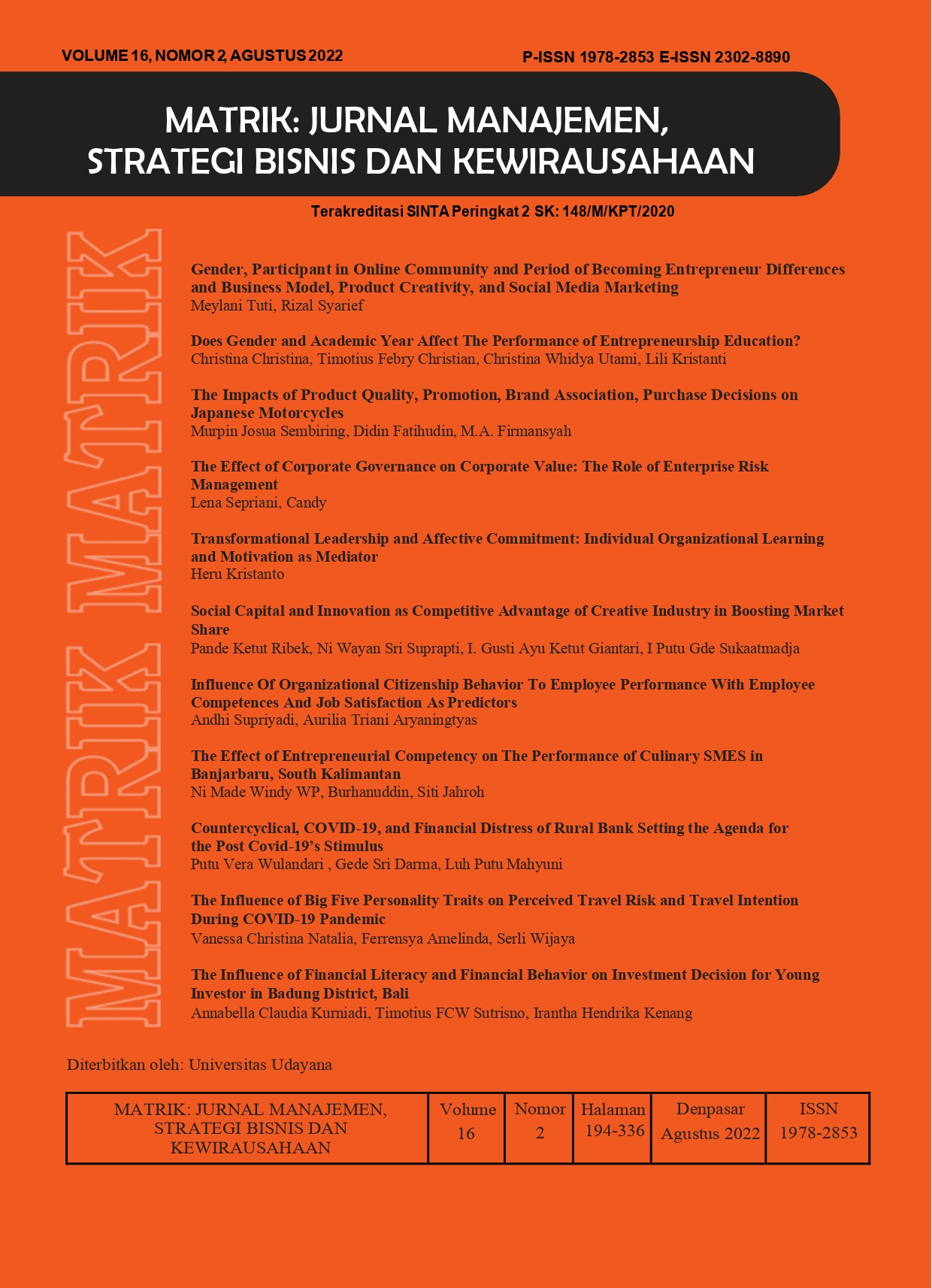Influence Of Organizational Citizenship Behavior To Employee Performance With Employee Competences And Job Satisfaction As Predictors
Abstract
In the age of globalization where the midst of increasingly fierce competition, human ability as a resource for mastery of technology, adaptation and responsiveness to change is needed. This research is done to explore and analyze the impact of job satisfaction and competency on employee performance. Besides that organizational citizenship behavior is a mediating variable. Respondents used in this study were employees of the Garment Company factory in Semarang Regency as many as 105 people. The questionnaire method is used to collect the primary data needed. The AMOS SEM program is used for analytical tools. The results of the study found that: 1). Employee competency variables and job satisfaction variables have a positive influence on OCB. 2). Employee competency variables and job satisfaction variables have a positive influence on employee performance. 3). OCB has a positive influence on employee performance. 4). Employee competency variables and job satisfaction variables have a positive influence through OCB on employee performance.
Downloads
References
Agusty Ferdinand. (2002). Structural Equation Modeling Dalam Penelitian Manajemen (2nd ed.). Badan Penerbit UNDIP.
Anindita, R., & Bachtiar, N. P. (2021). The Impact of Organizational Culture Towards Organizational Citizenship Behavior Through Job Satisfaction and Competency Among Online Media Employees. Business and Entrepreneurial Review, 21(1), 193–216. https://doi.org/10.25105/ber.v21i1.9279
Bernadin, John H., dan J. E. A. R. (1993). Human Resources Management an Experiental Approach. McGraw-Hill Inc.
Bozkurt Tülay. (2011). Management by Competencies.
Byars, Lloyd, L. dan L. W. R. (1998). Management : Theory and Application. Ricard D. Irwin Inc.
Darsana, M. (2013). The influence of personality and organizational culture on employee performance through organizational citizenship behavior. The International Journal Of Management, 35(4), 35–42. www.theijm.com
Dewanti, M. C., & Moko, W. (2020). The Role of Organizational Citizenship Behavior ( OCB ) and Organizational Commitments in Media- tion between Competence with Honorer Teacher Performance ( Study at State Middle School in Kediri City ). International Journal of Business, Economics and Law, 9(5), 1582–1588.
Fred Luthans. (2008). Organizational Behavior. (Tenth Edit). McGraw Hill.
Gomes, F. C. (2003). Manajemen Sumber Daya Manusia. Andi Offset.
Hanafi, A., Bemby Soebyakto, B., & Afriyanti, M. (2018). The Effect of Organizational Citizenship Behavior (OCB) and Quality of Work Life (QWL) on The Employee Work Performance with Motivation As An Intervening Variables at Industrial affairs Of South Sumatera Province. International Journal of Scientific Research and Management, 6(09), 676–685. https://doi.org/10.18535/ijsrm/v6i9.em03
Hansen, M. (2016). Organizational citizenship behaviours definitions and dimensions: Mutuality in business. Saïd Business School, 1, 1–16. www.sbs.oxford.edu/mutuality
Hasibuan, SP, M. (2007). Manajemen Sumber Daya Manusia (Edisi Revi). Bumi Aksara.
Kijpokin Kasemsap. (2013). Innovative Human Resource Practise : A Unified Framework and Causal Model of Psychological Empowerment, Job Satisfaction, Organizational Citizenship Behavior, and Organizational Performance. Suan Sunandha Rajabhat University, 11(11). https://doi.org/7763/IPEDR
Organ Dennis W. (1998). Organizational Citizenship Behavior : The Good Soldier Syndrome. Lexington Books.
Parulian Hutapea and Nuriana Thoha. (2008). Kompetensi Plus. PT. Gramedia Pustaka Utama.
Putu Ayu Rusmayanti, Ni Nyoman Putu Martini, N. Q. (2022). The Effect of Competence and Job Satisfaction on Organizational Citizenship Behavior and Employee Performance. International Journal of Business and Management Invention (IJBMI), 11(1). https://doi.org/DOI: 10.35629/8028-1101012129
Saragih, B., Sanusi, A., & Manan, A. (2017). The Influence of Job Satisfaction towards Employee Performance on the Antecedent of Competencies and Organizational Citizenship Behavior. IOSR Journal of Business and Management, 19(01), 21–27. https://doi.org/10.9790/487x-1901072127
Smith, C. A., Organ, D. W., & Near, J. P. (1983). Organizational citizenship behavior: Its nature and antecedents. Journal of Applied Psychology, 68(4), 653–663. https://doi.org/10.1037/0021-9010.68.4.653
Sugiyono. (2018). Metode penelitian kuantitatif (Setiyawami (ed.); 1st ed.). CV. Alfabeta.
Sulistyawan, P. (2017). Organizational Citizenship Behavior (OCB) sebagai Pemediasi pada Pengaruh Kompetensi dan Modal Psikologi (Psychological Capital) terhadap Kinerja (Studi Pada Badan Pusat Statistik Provinsi Jawa Tengah). Aset, 19(2), 151–160.
Supriyadi, A., Sanusi, A., & Manan, A. (2017). A Study on the performance of manufacturing employees : Organizational culture, compensation, organizational commitment, and organizational citizenship behavior. European Journal of Business and Management, 9(6), 32–43.
Sutrisno. (2012). Manajemen Sumber Daya Manusia (1st ed.). Prenada Media Group.
Tefera, C. A., & Hunsaker, W. D. (2020). Intangible assets and organizational citizenship behavior: A conceptual model. Heliyon, 6(7), e04497. https://doi.org/10.1016/j.heliyon.2020.e04497
Widodo, U. B., Hidayati, T., & Setiawati, L. (2021). Influence Of Organizational Culture And Competence On Job Satisfaction And Organizational Citizenship Behavior And Employee Performance PT PLN ( Persero ) Parent Unit of Kalimantan Mahakam Plant Control Management Unit. 10(5), 20–35. https://doi.org/10.35629/8028-1005022035
 This work is licensed under a Creative Commons Attribution-ShareAlike 4.0 International License.
This work is licensed under a Creative Commons Attribution-ShareAlike 4.0 International License.

















